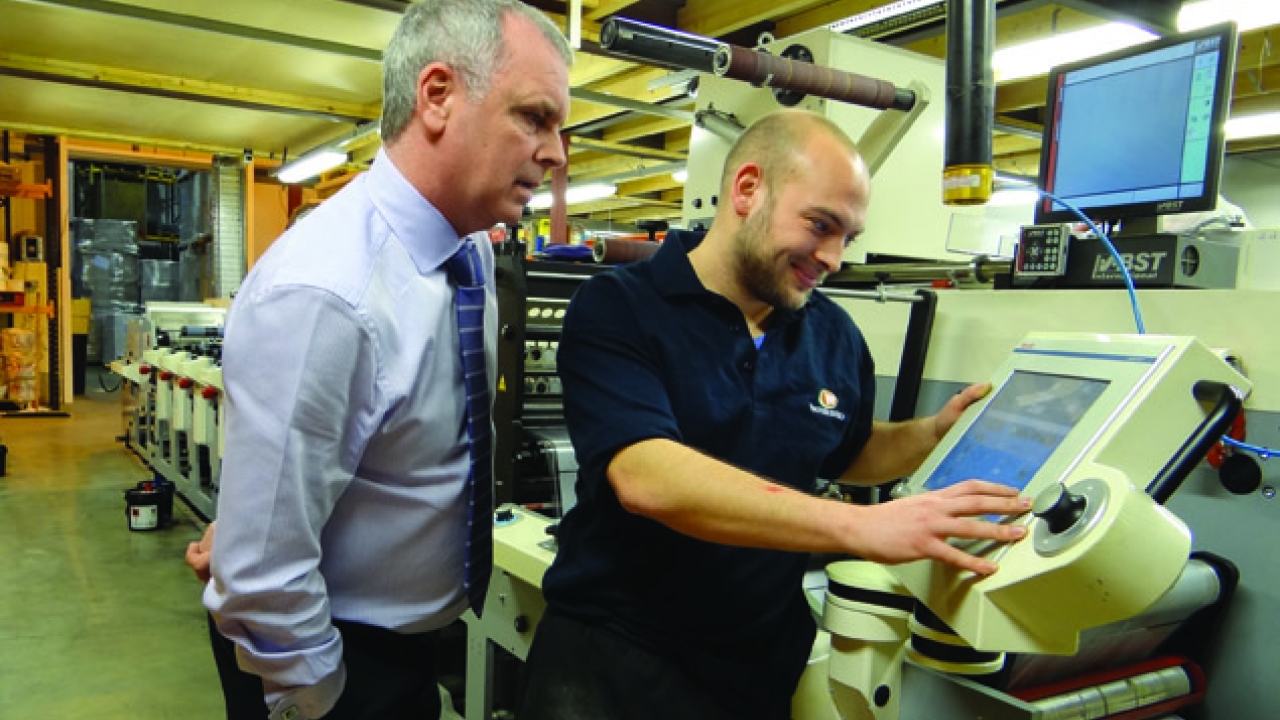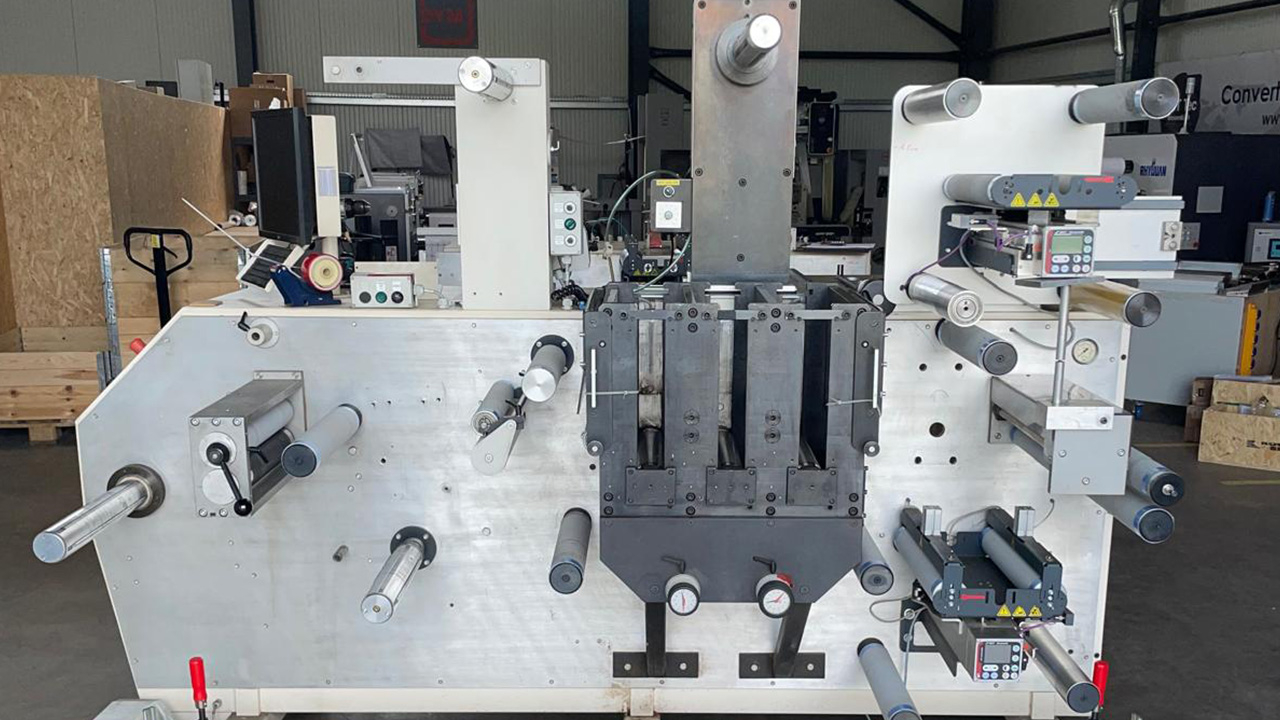Moving into film

Watershed Packaging has diversified from labels into flexible packaging with the installation of new MPS presses and a range of finishing kit. Andy Thomas reports
Consistency and consolidation could easily be the by-words for Yorkshire-based Watershed Packaging. Since its inception in 1993, the company has been led by owner, John Waters, from its early days as a supplier of packaging consumables to one of the UK’s leading label converters, and most recently, a showcase for MPS press technology. Today, the company operates from three sites: Leeds, which is still headquarters; Blackwood (Wales); and Beverley, also in Yorkshire.
To understand the reason behind the company’s success, which has seen annual sales double in the four years since 2007, one has only to quiz the energetic management team. ‘We run a tight operation and are all very much hands-on,’ explains group managing director, Stephen Walker. ‘The key to success is specialization, both in the skills you have and the work you do,’ he adds.
Anna Wood, group sales director, takes up this point: ‘We’re a very sales driven organization and have the capacity to secure large orders with our team. Our recruitment policy is to secure the right sales people, even from outside the industry, because we believe we can always teach them about print.’ Her words are brought to life by the recent promotion of the company’s sales manager to sales director, and the appointment of a new production manager.
But progress has not always been so rapid and, as Walker points out, various acquisitions over the years have done much to enrich Watershed’s business experience, and refine its expertise. In 1996 the company bought Logo Tapes, a supplier in Wales that added capacity to the packaging supplies department, and then in 1998, it acquired Ace Printing, based in Tunbridge Wells, Kent, which added the capacity of two flexo labels presses, and marked the company’s first tentative step in printing.
Six years on, and by then confident of its capability in print production, 2004 saw the installation of Watershed’s first new press, following a visit to that year’s Labelexpo in Brussels. Steve Walker explains: ‘We set out to look at slitter/rewinders, and came home having ordered a press! Even the choice was not straightforward. We had decided on one manufacturer’s press before seeing a demonstration by MPS – and that last minute change of heart has been fundamental to our growth and success in the intervening years.’
The press ordered was a 7-color EF 330, fitted with delam/relam and chill drums to allow the production of unsupported filmic substrates, and according to Walker: ‘It sold itself with its flexibility, which suited our requirements perfectly, and its operator-friendly design.’ The press was installed in the company’s new green field facility in Leeds, and in 2006, was joined by a second MPS press, this time a 7-color EP 330 of similar specification, but with the added advantage of being able to run flexo or screen in all print heads.
As business boomed and the MPS lines were kept fully loaded, the company acquired Aurora Colors in 2008 to grow its business, but by now the market was beginning to slacken, and Anna Wood began to look elsewhere for business. ‘We saw labels as a saturated market where profits were determined by service and quality – and while we knew we offered both, saw no sense in making further investments in new technology to serve a stagnating market.’
With label run lengths declining, but demand for flexible packaging on the rise, Watershed invested in a third MPS line, which was installed in 2011. Another EF 410, but fitted with Automatic Print Control (APC), which reduces make-ready time, stores job data for repeat work, and reduces waste, the new MPS ‘just eats work,’ according to Steve Walker, who claims to have it running regularly at 180 m/min in perfect register. This is helping to grow the flexible packaging element of the company’s output.
With its eyes on the shrink sleeve market, Watershed has also invested in a Freschi Tubolatrice sleeving machine. When commissioned, it will be the first of its kind in the UK, and typifies the company’s policy of continual investment, which has also seen a Bar Graphic Elite rewinder installed. Designed to run film, it has servo drive and a dual rewind, and has boosted productivity in the finishing department.
By the time this magazine is published, Watershed will have taken delivery of its fourth MPS line – this time a duplicate EF 410 of the 2011 machine, both of which use sleeve technology and enjoy the new shorter web path design that was introduced at Labelexpo in Brussels last year.
Praised for their reliability, the MPS lines have been fundamental to Watershed’s success. ‘We have budgeted 1.8 million pounds for presses in 2012,’ adds Walker, hinting at future investment. ‘We always buy quality, even it if costs more, and believe in preventative maintenance, because you cannot put a price on reliability,’ he concludes.
For Anna Wood and her sales team the future looks bright, with a decision to scale back on self-adhesive label volumes in favor of new and more profitable market opportunities in sleeves and linerless labels, as well as serving the rising demand for sachets.
Currently a staff group of 70 generates over eight million pounds turnover a year, and with the proposed move to an enlarged facility due in 2012, Watershed seems destined to continue on its path to success.
Pictured: Group managing director Steve Walker (left) watches flexographic machine manager, Nylle Rosendale, adjust set up on the company’s latest MPS EF 410
This article was published in L&L issue 2, 2012
Stay up to date
Subscribe to the free Label News newsletter and receive the latest content every week. We'll never share your email address.


